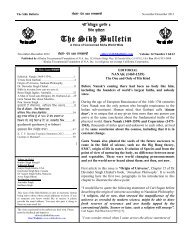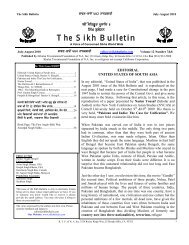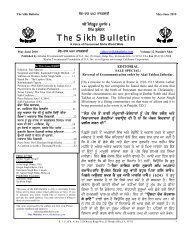Selected Editorials - The Sikh Bulletin
Selected Editorials - The Sikh Bulletin
Selected Editorials - The Sikh Bulletin
You also want an ePaper? Increase the reach of your titles
YUMPU automatically turns print PDFs into web optimized ePapers that Google loves.
during his stay at a madrassa in Mecca from 1927-1930. Following quote is from that article to be<br />
published in the September-October 2012 issue of the <strong>Sikh</strong> <strong>Bulletin</strong>:<br />
“Siyahto Baba Nanak Shah Faqir, by Haji Tajjudin Naqshbandhi, who had met Guru Nanak during the<br />
hajj. Tajjudin caught up with Guru Nanak in the town of Undlas located between Erar and Bagdad and<br />
travelled thereafter with him as a member of his entourage. He thus remained with Guru Nanak during<br />
the years of 1504-06.<br />
During Guru Nanak's visit to Mecca, Qazi Ruknuddin was among the first batch of Muslims who had<br />
extensive dialogue with him. After the incident in which Nanak was found sleeping with his feet pointing<br />
in the "wrong" direction, several Hajjis or pilgrims to Mecca-Medina gathered around Guru Nanak,<br />
seeking a dialogue.<br />
Qazi Ruknuddin then asked Nanak:<br />
“Fala Allah mazabo” (What is your religion)<br />
To that Guru Nanak responded:<br />
“Abdulla Allah la mazaboo” (I am a man of God and belong to no religion.)<br />
This was one of some 360 questions and answers from Guru Nanak’s dialogues during his Middle-East<br />
Visit.”<br />
This response by Guru Nanak reminded me of a similar utterance I heard in a scene of a play, ‘Bulleshah’<br />
(1680-1757) performed in Chandigarh by a Pakistani group, about ten years ago. Two of his disciples<br />
were accosted by the religious police while eating during daylight during the month of Ramadan. When<br />
asked what religion they belonged to they responded that they were Muslims. Bulleshah told them that<br />
with their response they asked for that treatment because a Muslim is not supposed to eat during the day<br />
time during the month of Ramadan fasting; that their answer should have been ‘we are men of God’.<br />
Guru period and Mughal period were contemporary periods. <strong>The</strong>re should be a wealth of original<br />
information in the archives of the Mogul Empire in Persian, the official language of the court. We need to<br />
train future researchers, proficient in Panjabi, Persian and English.<br />
Hardev S. Shergill<br />
*****<br />
EDITORIAL<br />
NANAK (1469-1539)<br />
<strong>The</strong> One and Only of His Kind<br />
(From the November-December 2012 <strong>Sikh</strong> <strong>Bulletin</strong>)<br />
Before Nanak’s coming there had been no body like him, including the founders of world’s largest<br />
faiths, and nobody since.<br />
During the age of European Renaissance of the 14th–17th centuries Guru Nanak was the only person who<br />
brought renaissance to the Indian sub-continent. Human mind, that Gurbani calls ‘dasam duar’, is so<br />
unique that at any given time more than one person can arrive at the same conclusion about the<br />
fundamental truths of the physical world. Guru Nanak (1469-1539) and Copernicus (1473-1543),<br />
thousands of miles apart and unknown to each other, arrived at the same conclusion about the cosmos,<br />
including that it is in constant change.<br />
73
















